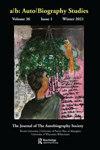Biofiction as Cultural Intervention: The Tragic Failure of Lion Feuchtwanger’s Jud Süß
Q1 Arts and Humanities
引用次数: 0
Abstract
Abstract As a literary form, biofiction started to dominate in the 1990s, and over the last ten years, biofiction studies has surged dramatically. While scholars acknowledge that there were some important biofictions in the nineteenth century, the form first started to catch fire in the early twentieth century, especially among German writers who emigrated to the United States during the Nazi era. Klaus Mann, Heinrich Mann, Thomas Mann, Hermann Broch, Franz Werfel, Bruno Frank, and Bertolt Brecht are only a few who published noteworthy biofictions, but it was Lion Feuchtwanger who had perhaps the biggest impact, with the 1925 publication of Jud Süß, a biographical novel about the famous court Jew. This novel was a best-seller, which, in part, contributed to the massive surge in the publication of biofictions during the 1930s. But there are some serious concerns revolving around the work, which became most obvious after the release of Veit Harlan’s 1940 film Jud Süß. By analyzing the novel and film in relation to the Nazis‘ anti-Semitic political agenda, I clarify why Feuchtwanger’s novel not only failed tragically to accomplish what it set out to do, but also contributed significantly to an agenda that it sought to resist and debunk. This essay focuses primarily on Feuchtwanger’s novel in order to clarify what biofiction is, how it uniquely functions and signifies, and some of the potential problems with the genre.作为文化干预的传记小说:利昂·福伊希万格的《犹太文学》的悲剧性失败
摘要:传记小说作为一种文学形式,在20世纪90年代开始占据主导地位,近十年来,传记小说研究迅猛发展。虽然学者们承认19世纪有一些重要的传记小说,但这种形式最初开始流行是在20世纪初,尤其是在纳粹时期移民到美国的德国作家中。克劳斯·曼、海因里希·曼、托马斯·曼、赫尔曼·布洛赫、弗朗茨·韦费尔、布鲁诺·弗兰克和贝托尔特·布莱希特只是少数出版了引人注目的传记小说的人,但影响最大的可能是狮子·福伊希万格,他在1925年出版了一本关于著名宫廷犹太人的传记小说《犹太》。这部小说是一本畅销书,在一定程度上促成了20世纪30年代生物小说出版的大规模激增。但围绕这部作品存在着一些严重的担忧,这些担忧在维特·哈兰(Veit Harlan) 1940年的电影《judd s》上映后变得最为明显。通过分析小说和电影与纳粹反犹主义政治议程的关系,我澄清了为什么法伊希万格的小说不仅悲剧地未能完成它所要做的事情,而且还对它试图抵制和揭露的议程做出了重大贡献。本文主要关注法伊希万格的小说,以澄清传记小说是什么,它的独特功能和意义,以及该类型的一些潜在问题。
本文章由计算机程序翻译,如有差异,请以英文原文为准。
求助全文
约1分钟内获得全文
求助全文
来源期刊

a/b: Auto/Biography Studies
Arts and Humanities-Literature and Literary Theory
CiteScore
0.80
自引率
0.00%
发文量
27
期刊介绍:
a /b: Auto/Biography Studies enjoys an international reputation for publishing the highest level of peer-reviewed scholarship in the fields of autobiography, biography, life narrative, and identity studies. a/b draws from a diverse community of global scholars to publish essays that further the scholarly discourse on historic and contemporary auto/biographical narratives. For over thirty years, the journal has pushed ongoing conversations in the field in new directions and charted an innovative path into interdisciplinary and multimodal narrative analysis. The journal accepts submissions of scholarly essays, review essays, and book reviews of critical and theoretical texts as well as proposals for special issues and essay clusters. Submissions are subject to initial appraisal by the editors, and, if found suitable for further consideration, to independent, anonymous peer review.
 求助内容:
求助内容: 应助结果提醒方式:
应助结果提醒方式:


